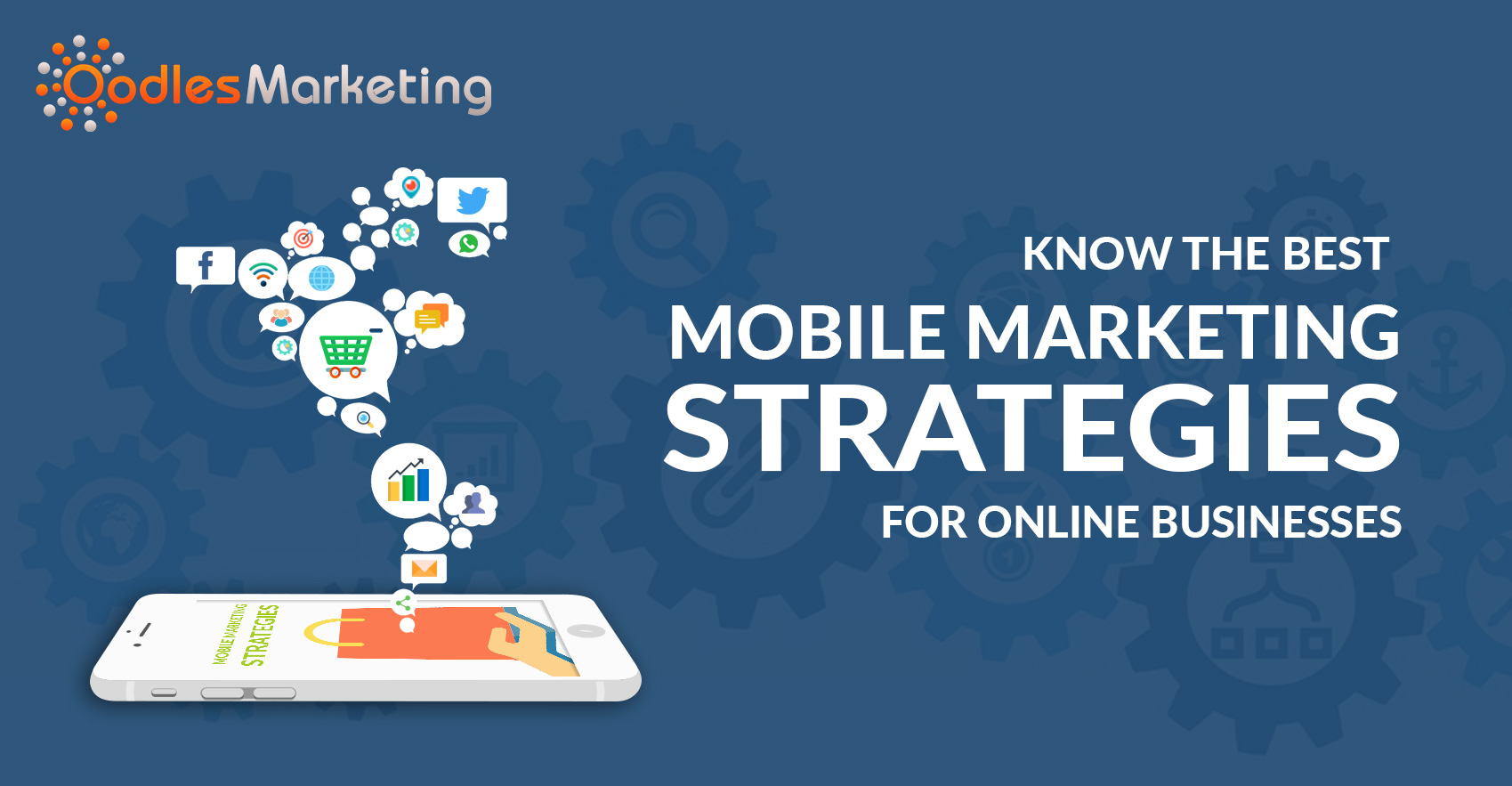Mobile Marketing Strategies For E-commerce Success

Table of Contents
Optimize Your Website for Mobile
A mobile-friendly website is paramount for successful mobile marketing. Your website needs to provide a seamless and enjoyable user experience (UX) regardless of the device used. This means prioritizing mobile optimization through responsive design and focusing on speed. Google's mobile-first indexing means your site's mobile version is often the primary version Google crawls and indexes. A slow, clunky mobile site will lead to high bounce rates and lost sales.
- Implement responsive web design: Ensure your website adapts seamlessly to different screen sizes, from small smartphones to large tablets. This provides consistent branding and usability across all devices.
- Optimize images for faster loading: Compress images without sacrificing quality to improve page load speed. Slow loading times are a major turn-off for mobile users.
- Ensure easy navigation and clear calls to action: Mobile users need intuitive navigation and clearly defined calls to action (CTAs). Make it easy for them to find what they're looking for and complete a purchase.
- Prioritize mobile-first indexing: Optimize your site specifically for mobile devices to improve search engine rankings. Google's mobile-first index prioritizes the mobile version of your website in search results.
- Conduct regular mobile usability testing: Regularly test your website's mobile usability to identify and fix any issues that hinder the user experience. Tools and user feedback are crucial here.
Leverage Mobile Apps for Enhanced Engagement
A dedicated mobile app can significantly enhance customer engagement and brand loyalty, transforming your mobile strategy. It provides a direct line to your customers, offering opportunities for personalized communication and repeat business. Smart app marketing is crucial for success.
- Develop a user-friendly mobile application: Create an app that is intuitive, easy to navigate, and visually appealing. A poor user experience will quickly drive users away.
- Implement push notifications for targeted promotions: Send targeted push notifications to promote new products, special offers, or remind users about abandoned carts. Personalization is key.
- Offer exclusive in-app content and discounts: Provide exclusive content, discounts, and early access to sales to incentivize app downloads and engagement. This builds loyalty.
- Optimize your app store listing for better visibility (ASO): Use relevant keywords and compelling visuals in your app store listing to improve app discoverability. ASO is like SEO for your app.
- Monitor app reviews and user feedback: Actively monitor app reviews and user feedback to identify areas for improvement and address any issues promptly. This demonstrates you care.
Harness the Power of Mobile Advertising
Mobile advertising offers a powerful way to reach your target audience on their smartphones and tablets. Various options are available, each with its strengths and weaknesses. Careful targeting and compelling ad creatives are essential for success.
- Utilize targeted mobile advertising campaigns: Use demographic, behavioral, and location-based targeting to reach the right audience with your mobile ads.
- Experiment with different ad formats (video, image, text): Test different ad formats to see which performs best for your target audience. Video ads, especially short, engaging ones, can be very effective.
- Track campaign performance and adjust strategies accordingly: Monitor key metrics like click-through rates (CTR) and conversion rates to optimize your campaigns over time.
- Leverage location-based targeting for increased relevance: Use location-based targeting to reach customers in specific geographic areas, particularly useful for local businesses.
- Consider retargeting campaigns to re-engage potential customers: Retargeting users who have visited your website or app but haven't made a purchase can be highly effective.
SMS Marketing for Direct Communication
SMS marketing, or text message marketing, allows for direct, personalized communication with your customers. It's a powerful tool for promoting sales, providing updates, and building relationships. However, always obtain explicit consent and adhere to all relevant regulations.
- Obtain explicit consent before sending SMS messages: Ensure you have permission from your customers before sending them any SMS messages to avoid legal issues and maintain customer trust.
- Segment your audience for targeted messaging: Divide your audience into segments based on demographics, purchase history, or other relevant factors to send more relevant messages.
- Offer exclusive deals and promotions via SMS: Use SMS to offer exclusive deals and promotions that are only available to your SMS subscribers.
- Use SMS for order updates and shipping notifications: Keep your customers informed about their orders by sending them updates and notifications via SMS.
- Track SMS campaign performance to optimize future efforts: Monitor your SMS campaigns to see which messages are most effective and adjust your strategy accordingly.
Analyze and Optimize Your Mobile Marketing Efforts
Data-driven decision-making is critical for successful mobile marketing. Regularly analyze your mobile marketing efforts to identify what's working and what's not. Use analytics to inform your strategy and continually optimize your approach.
- Track key metrics like click-through rates (CTR), conversion rates, and ROI: Monitor these key performance indicators (KPIs) to assess the effectiveness of your mobile marketing campaigns.
- Use Google Analytics to analyze mobile traffic and user behavior: Google Analytics provides valuable insights into your mobile traffic sources, user behavior, and conversion rates.
- Conduct A/B testing on different mobile ad creatives and landing pages: A/B testing helps you identify which ad creatives and landing pages are most effective at converting users.
- Regularly review and adjust your mobile marketing strategy based on data: Continuously analyze your results and adjust your strategy based on what the data tells you.
- Implement conversion rate optimization (CRO) techniques to maximize sales: CRO helps you improve your website's design and functionality to increase the percentage of visitors who convert into customers.
Conclusion
Implementing a comprehensive mobile marketing strategy is vital for e-commerce success. By optimizing your website for mobile, leveraging mobile apps, harnessing the power of mobile advertising and SMS marketing, and meticulously analyzing your results, you can significantly improve customer engagement, boost sales, and gain a competitive edge in the dynamic world of online retail. Don't delay – start optimizing your mobile marketing strategy today to unlock the full potential of your e-commerce business and experience significant growth. Develop a winning mobile marketing strategy now!

Featured Posts
-
 The Bittersweet Return Of Tony Todd In Final Destination Bloodlines
May 19, 2025
The Bittersweet Return Of Tony Todd In Final Destination Bloodlines
May 19, 2025 -
 Ierosolymon T Heofilos Onomastiki Eorti Kai Symvolismos
May 19, 2025
Ierosolymon T Heofilos Onomastiki Eorti Kai Symvolismos
May 19, 2025 -
 Kristen Stewart And Hollywoods Seismic Shift A New Era
May 19, 2025
Kristen Stewart And Hollywoods Seismic Shift A New Era
May 19, 2025 -
 Santos Ufc 313 Strategy Knockout For 50 000 And Babys Diapers
May 19, 2025
Santos Ufc 313 Strategy Knockout For 50 000 And Babys Diapers
May 19, 2025 -
 Suncoast Searchlight Increased Demand For Mental Health Services Stretches Resources Thin
May 19, 2025
Suncoast Searchlight Increased Demand For Mental Health Services Stretches Resources Thin
May 19, 2025
